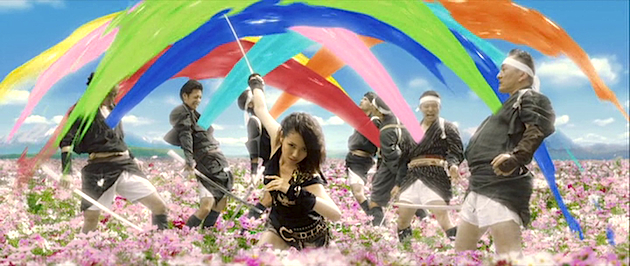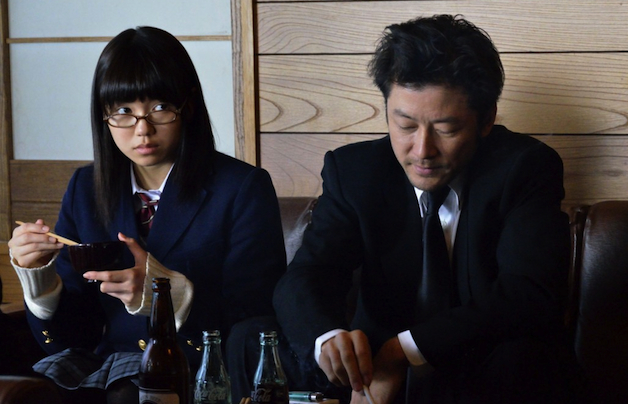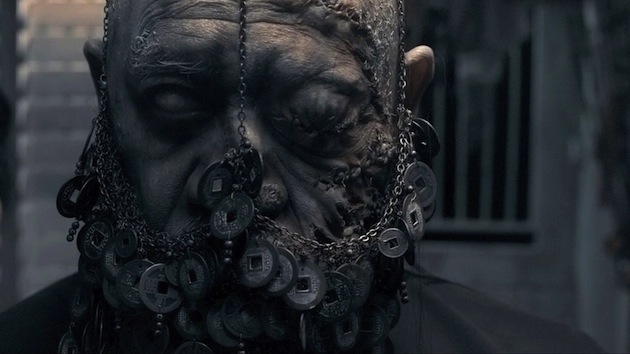
Rigor Mortis
At first glance Rigor Mortis may appear to be no more than a slightly more successful version of a Pang Brothers flick—there’s an opportunistic, free-wheeling approach to the supernatural, some familiar “Asian” tropes, a bunch of CGI-heavy sequences. Yet such a comparison would ultimately be as facile as it sounds. Here discipline of both technique and genre is on display every step of the way, and nothing at all is lazy (well, except for a severed-arm effect that isn’t quite believable). Moreover, script and direction complement each other so well that we’re presented with a striking blend of earnest, often affecting, themes of loss/sacrifice with bracing, even disturbing, scenes of graphic horror.
And speaking of horror, fans who’ve heard that the film simply updates the “hopping vampire” archetype may be surprised that the central creature is not so much the monster as the humans who reanimate and sustain him in the first place. Sure, you can already see Rigor Mortis via a few digital platforms, but the stunning visuals and the fact that it underscores NYAFF’s perennial goal of connecting old and new makes it one of the titles you’ll want to catch on the fest’s big screen. -- Peter Gutierrez
My Man
Kumakiri Kazuyoshi's 2004 film Antenna was an intense exploration of transgressive sexuality, and now in 2014, he has gone even further into the taboo-busting thickets with My Man, based on Sakuraba Kazuki's controversial best-selling novel. The devastating 1993 tsunami in Okushiri, Hokkaido brings two lost souls together: Hana (Nikaido Fumi), 10 years old at the time of the disaster, and Jungo (Asano Tadanobu), a distant relative who takes her in and becomes her de facto father.
As Hana grows up, and their lingering sense of personal loss and their hermetic isolation increases, their familial relationship becomes an erotic one. My Man is a pitch dark portrait of psychological trauma and erotic obsession graced with a melancholic atmosphere and complexly layered performances by Asano and Nikaido, who will receive the Screen International Rising Star Award at this year’s festival. -- Christopher Bourne

The Great Passage
While I am often not the one for old-fashion sentiment it is hard to deny the charm and heart of Ishii Yuya's decades spanning tale on dedication to one's craft. Snagging a bevy of Japanese Academy Awards earlier this year, Ishii, director of quarter-life crises comedy Sawako Decides, gathers a cast of industry all-stars and promising newcomers to populate the dusty old office of a publisher's dictionary department. Yep, you heard that right, this film is, in someways, about the creation of a dictionary. Lovers of words and astute appreciators of process will gravitate towards the film easy enough, but don't count this one out as boring.
Channeling old-guard directors like Ozu, Ishii cultivates a tale brimming with equal parts joy and melancholy. It's a collection of small moments, slices of life, the little gestures that carry us on into the next year, or ten.
It also operates as a fascinating rumination on changing culture and technology, and the people behind the scenes of services and resources we often take for granted. Ishii and his cast put a very human face to this, and like their work, the film endures, if in a relatively safe and conservative fashion. --Ben Umstead
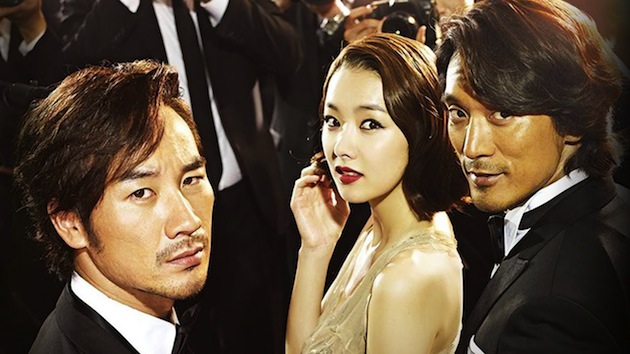
Top Star
Actor Park Joong-hoon makes his directorial debut, in which he takes advantage as his position as the ultimate Korean entertainment industry insider to create a drama that gets behind the scenes of the fame and glamour, and the corrupting nature of extreme ambition.
Park has essentially created an update of All About Eve, this time with two men as the rivals. Tae-sik (Uhm Tae-woong) is the manager of star actor Won-joon (Kim Min-jun), but he has long harbored his own dreams of stardom. Tae-sik finally gets his big break when he saves Won-joon from legal trouble and a public scandal; Won-joon features him in his TV drama to show his appreciation. Tae-sik’s growing fame soon eclipses Won-joon’s, and Tae-sik becomes increasingly ruthless in his ambition and in his willingness to take down anyone who stands in his way.
Park makes a slickly entertaining, well-acted film (not surprising with an actor at the helm), which feels must be at least partly based on true incidents. Although Top Star somewhat loses its nerve by softening Tae-sik’s inevitable comeuppance, it nevertheless compellingly conveys the dark side of fame and fortune. --Christopher Bourne
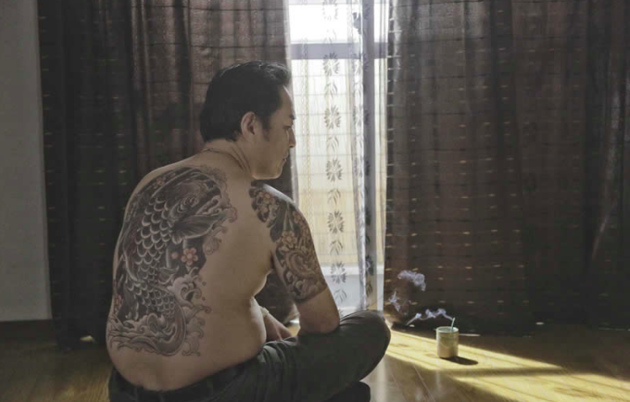
The Devil’s Path
“This kind of thing exists in the world? ...Bad people like this exist? ...People get killed like this?” When dialogue lays out moral metaphysics as plainly as this, it’s disarming enough, but here it also provides clues to the driving aesthetic: to reveal how things simply exist, unspeakable things, and how, sometimes, narrative film can attempt to speak them—and how by doing so tonelessly, with minimal artistic intrusion, the full weight of the horror can be appreciated.
Certainly the harrowing opening scenes of The Devil’s Path are as nasty as they come, and the matter-of-fact tone adds to the sense of transgression. When the story becomes more investigative/procedural, it’s tempting to think the dark stuff was just a come-on. To its credit, though, the plot of The Devil’s Path turns recursively on itself, revisiting events with fresh helpings of context. The term “character study” helps explain the meditative pacing and the fact that we (mostly) avoid the standard trappings of the yakuza thriller or legal drama. However, the ambitions encompass more than a single character, despite how unforgettable Pierre Taki’s performance is; indeed, the goal seems to be capturing the tragic aspects of social anomie generally, and there the film arguably succeeds. -- Peter Gutierrez

Zone Pro Site: The Moveable Feast
Chen Yu-hsun makes his return to feature filmmaking after a 16-year absence with this delightful foodie comedy, full of local color but whose sweetness and generous spirit is eminently translatable well beyond Taiwanese borders. The film celebrates traditional Taiwanese banzhuo food culture of outdoor banquets; the rather nonsensical English title is an approximation of the Taiwanese term for the master chefs who prepare such feasts.
The film follows Hsiao-wan (Kimi Hsia), the daughter of a master chef, desperately tried to flee the family business, unsuccessfully pursuing an acting and modeling career, but she must return to her roots to alleviate her financial troubles. Hsiao-wan and her mother enter a banzhuo competition to win enough prize money to settle Hsiao-wan’s debt. They enlist the help of “Doctor Gourmet” (Tony Yang), a young man Hsiao-wan met on the train, who makes his living helping people improve their cooking.
Zone Pro Site clocks in at a hefty 145 minutes, but the length allows us to fully immerse ourselves in its wonderfully evocative depiction of a fascinating food culture and equally fascinating characters, as well as reveling in its almost trippy candy-colored visual schemes. Needless to say, do not view on an empty stomach. --Christopher Bourne
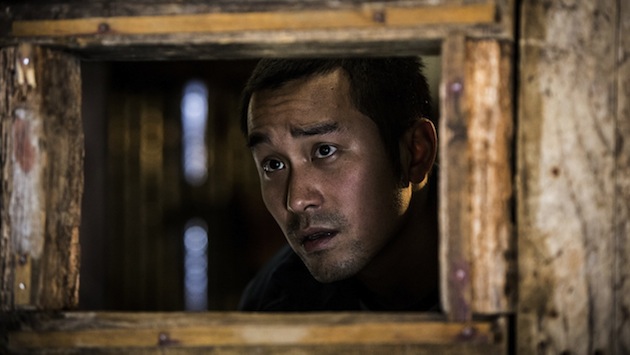
Soul
With now just three features to his credit, Chung Mong-hong has established himself as one of Taiwan’s most accomplished talents, offering highly idiosyncratic takes on genre with evocative visuals. This is certainly true of his latest film Soul, which combines disturbing violence with wryly deadpan black humor.
The film begins with A-Chuan (Joseph Chang), in a moody, nearly silent opening sequence, who suddenly collapses while working as a sous chef. After he recovers from a brief hospital stay, he is driven by his sister (Chen Shiang-chyi) to the home of his father Wang (Jimmy Wang Yu), who lives deep in the woods of central Taiwan. After A-Chuan’s sister remarks that he’s acting in a weird way, horrific events are set into motion, especially after A-Chuan suddenly, without apparent motivation, commits murder. A-Chuan begins speaking in a different tone, apparently that of a spirit possessing his body. Wang takes an protective stance toward his son, locking him away in a shed, working overtime to cover up the crime, including dispensing with whoever has the temerity to come around asking questions.
Soul is an intriguingly melancholy, slow-burn thriller, with impossibly stunning and artful cinematography by Chung himself (working under the nom de cinema Nakashima Nagao). --Christopher Bourne
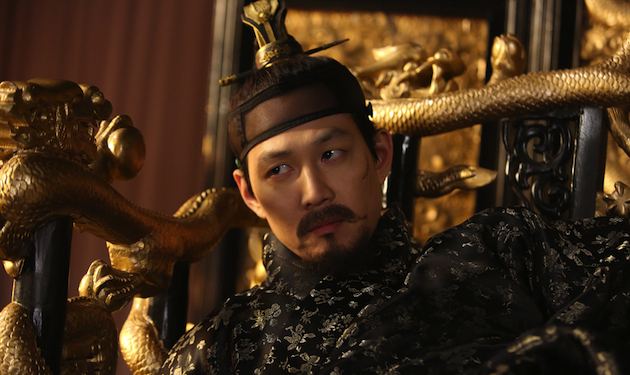
The Face Reader
Han Jae-rim, one of Korea’s best filmmakers, returns from a six-year absence with The Face Reader, a massive-box office hit last year that transforms its familiar Joseon dynasty-era costume drama trappings into an existential inquiry into the nature of destiny and character. There is none of the fusty, mannered atmosphere that often afflicts period pieces; this film always feels fresh and contemporary.
The story deals with the ancient art of physiognomy, or “face reading,” which here seems like a cross between fortunetelling and CSI-type sleuthing. Nae-kyung (Song Kang-ho), a master of this art, lives in countryside seclusion. Word spreads of his face-reading abilities and later employed by the court, Nae-kyung becomes embroiled in the power struggle between vice-premier Kim Jong-seo (Baek Yoon-sik) and the King’s brother, Grand Prince Suyang (Lee Jeong-jae), who schemes to usurp the throne from the deceased King’s very young successor.
The Face Reader is somewhat overlong, and could have greatly benefited from a much tighter narrative construction. Still, this remains a superior period yarn, handsomely mounted and terrifically acted. Song Kang-ho gives a typically moving and committed performance, while Lee Jeong-jae impresses as a ruthlessly lupine villain. -- Christopher Bourne





















